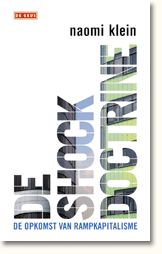
'In So Many Cases, Democracy Rises from Catastrophe, Naomi Klein Argues
By John Freeman
The Cleveland Plain Dealer
According to economists in the University of Chicago school of thought, free-market ideas spread across the planet in a series of natural if sometimes painful historic developments. And the unprecedented (and highly lucrative) access Western capital enjoyed to these emerging markets is essential to kick-starting democratic reform.
In this towering polemic, Naomi Klein demolishes this narrative, arguing that the evidence tells a different story. Skipping across several decades and numerous U.S. administrations of both parties, Klein shows how the free-market ideas associated with Milton Friedman have spread often through catastrophe (as in Thailand, post-tsunami, and in New Orleans, post-Katrina) and at the point of a gun (as in Chile in 1973 and Iraq today).
Klein, a journalist whose book, "No Logo: Taking Aim at the Brand Bullies" was translated into 28 languages, argues here that the violence necessary to foster such free-market reforms will only increase.
Many decades ago, Marxist historian Walter Rodney labeled a similar phenomenon "the underdevelopment of Africa," describing a deliberate molding of developing economies by imperialism to serve its own needs. Today, Klein calls it "The Shock Doctrine: The Rise of Disaster Capitalism." She takes her cue from the role shock and awe, in all forms, plays in getting the local populace to cooperate: book-burning, bombing, widespread arrests and roundups - even torture.
Readers of Howard Zinn's "A People's History" will recognize an ideological stance at work here. But Klein is not simply a woman with a bullhorn. A fierce writer whose prose has the metaphorical gusto of Susan Sontag's in its best moments, Klein manages to weave a narrative out of a large variety of historical events that is equal parts cultural commentary and investigative journalism.
Her most powerful segments deal with events of recent years. Take, for instance, her ability to encapsulate the mess that is Iraq. Among other things, "The Shock Doctrine" shows how the growing role of civilian contractors, Abu Ghraib, the insurgency, and the constant, spooky presence of Halliburton in so many recent projects (which include the building of Guantanamo and the reconstruction of New Orleans) all stem from the shock doctrine.
For instance, in describing how so much money gets spent and so little done in Iraq, Klein creates this daisy-chain sentence. "The big contractors set up offices in the Green Zone, or even Kuwait City and Amman, then subcontracted to Kuwati companies, who subcontracted to Saudis, who, when the security situation got too rough, finally subcontracted to Iraqi firms, often from Kurdistan, for a fraction of what the contracts were worth."
Klein reminds us that, contrary to his public statements, Dick Cheney will profit enormously from his continued association with Halliburton. Here is why this book, angry as it is, deserves such a wide audience. It reminds us that the purpose of government is to serve the most people as best it can. Under the shock doctrine, Klein argues, the opposite occurs: One class of people comes up with the plan, another does the fighting, and a third, way at the bottom, deals with the fallout.
If you accept this assessment, it's not hard to see why such policies earn what the CIA calls "blowback."
---------
Freeman is president of the National Book Critics Circle.'



Geen opmerkingen:
Een reactie posten